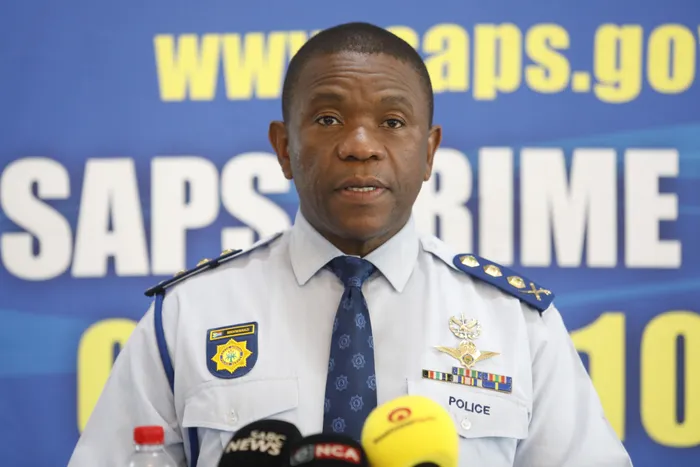
KwaZulu‑Natal Provincial Police Commissioner Lt‑Gen Nhlanhla Mkhwanazi to testify at the Madlanga Commission on September 17.
Image: Doctor Ngcobo / Independent Newspapers
THE success of the Judicial Commission of Inquiry into Criminality, Political Interference, and Corruption in the Criminal Justice System, known as the Madlanga Commission, will depend on how the Commission's findings and recommendations are implemented.
This is according to the Police and Prisons Civil Rights Union (Popcru) as the Commission begins its first public hearings in Pretoria on Wednesday.
Proceedings will take place at the Bridgette Mabandla Justice College, where seating for up to 300 people will be available on a first-come, first-served basis with strict access control measures in place.
The inquiry comes in response to allegations made by KwaZulu-Natal Provincial Commissioner Lt Gen Nhlanhla Mkhwanazi, that criminal syndicates have infiltrated law enforcement, intelligence services, and other key pillars of the justice system.
Mkhwanazi is expected to be the first witness to testify.
The commission will be chaired by Acting Deputy Chief Justice Mbuyiseli Madlanga assisted by Advocate Sesi Baloyi SC and Advocate Sandile Khumalo SC.
Under the spotlight are issues including the role of current or former senior officials in SAPS, the National Prosecuting Authority, State Security Agency, the Judiciary and Magistracy and the metro police departments who may have aided or abetted the alleged criminal activity; failed to act on credible intelligence or internal warnings; or benefited financially or politically from a syndicate's operations.
The commission will not be able to take any action against anyone, instead it will make findings and recommendations for “criminal prosecutions, disciplinary actions and institutional reform”, president Cyril Ramaphosa said in July.
After the Commission completes its work, a final report will be submitted to Ramaphosa. Interim reports are expected after three and six months respectively.
Popcru said they believed the commission was a step in the right direction.
“Our members work in extremely challenging environments, and their ability to serve communities effectively is often undermined when these systemic issues go unaddressed.
"There is a sense of cautious optimism. Our members want to see real accountability and lasting reforms, but they are also aware that commissions in the past have sometimes not translated into tangible changes on the ground. For them, the success of this process will depend on how its findings and recommendations are implemented,” said Popcru spokesperson, Richard Mamabolo.
Popcru was hopeful the commission would help “restore integrity and public trust in the criminal justice system, while also protecting workers from being scapegoated for failures that stem from broader structural and political challenges”.
“Most importantly, we would like to see clear action plans to strengthen institutions, safeguard their independence, and ensure that those found to be involved in wrongdoing face consequences. We urge that the commission’s work be guided by transparency and urgency, with recommendations that are practical and enforceable. Our position has always been that the criminal justice system must serve the public interest, not narrow political or personal agendas,” Mamabolo added.
However criminologist Dr Simon Howell was not as optimistic, saying the criminal justice system was where these issues should have been dealt with.
“This is not the first inquiry we’ve had on a topic of interest to the public and as such the precedent has been set with such things, as with the Zondo Commission. I don't hold my hopes up too high that any significant aspect will be found or detailed or prosecuted. We may talk about these problems but I doubt anything will actually come of it, that’s historically how things have operated.
“Frankly they should just indicate that the criminal justice system needs to deal with these issues like it should be doing in the first place without any commission of inquiry and they should forward anything that needs to be dealt with by the criminal justice system through the criminal justice system so it can be dealt with the way it should be.”
Howell said, in his view, it was a waste of money, time and effort and a means to “deflect from the actual issues that need to be focused on”.
“It’s taking away attention and it is ultimately a talk shop designed to appease political powers with very little actionable results,” said Howell.
Meanwhile the MK Party’s high court application in the Gauteng High Court contesting the Commission's legality is expected to be heard on Wednesday and Friday.
MKP national spokesperson Nhlamulo Ndhlela told Newzroom Afrika that the start of the commission should have waited until after their court hearing.
“Instead they chose a date just before a full sitting of three judges. So if you look it prejudices the South African purse. You're going to have at least two to the three senior counsels, witnesses also bringing senior counsels. The cost factors are high, you're looking (at) at least a million rand a day on a process we still believe is illegitimate. We believe this is unnecessarily rushed. There is no need for a judicial commission of inquiry, let the police do their work. From an oversight perspective it is parliament's responsibility,” he said.
The party wants the announcement of the commission, the appointment of Police minister Professor Firoz Cachalia in an acting capacity to be reversed, among others.
Cape Times
Related Topics: